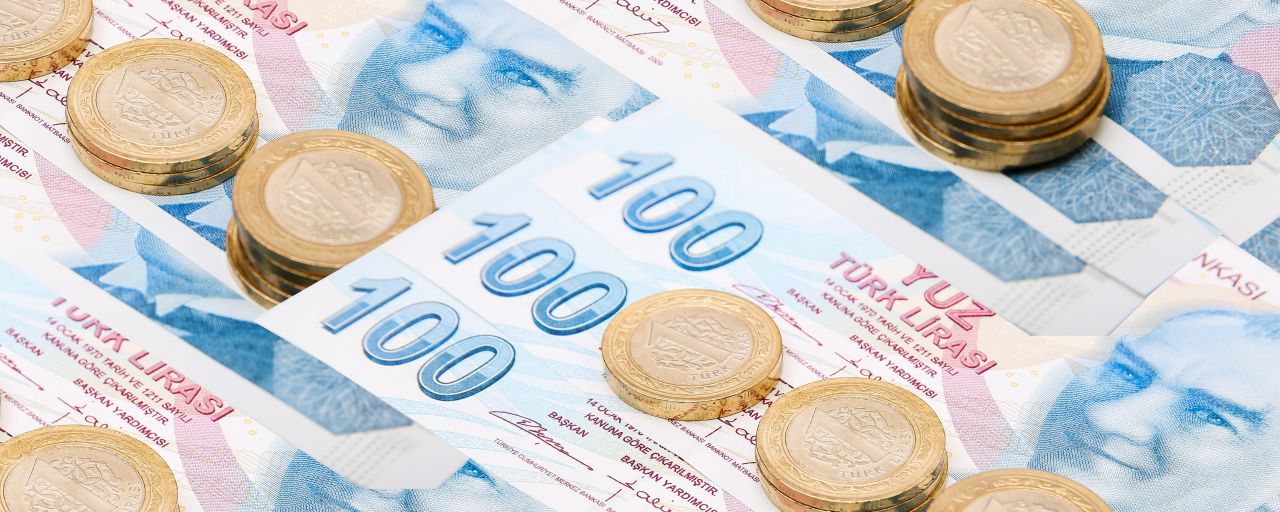When planning a travel to Turkey, understanding its currency is essential to navigate the financial aspects of your journey smoothly. The official currency of Turkey is the Turkish Lira (TRY), and this guide provides valuable information about the currency, its denominations, exchange rates, payment methods, and tips for managing your finances effectively.
Turkish Lira: An Overview

The Turkish Lira (TRY) holds a central role in Turkey's economy and daily transactions. Understanding its structure and denominations is essential for a smooth financial experience in the country.
Currency Details
The Turkish Lira is the official currency of Turkey, represented by the symbol "₺" and the currency code TRY. The lira is subdivided into smaller units called kuruş. One lira is equivalent to 100 kuruş. The currency comes in various denominations, including:
- Banknotes: 200, 100, 50, 20, 10, and 5 lira bills.
- Coins: 1 lira, 5, 10, 25, and 50 kuruş coins.
Foreign Currency Usage
While the official currency is the Turkish Lira, you might encounter prices marked in euros, US dollars, or pounds, especially in tourist areas and larger cities. However, it's generally recommended to pay in the local currency to avoid unfavorable exchange rates set by merchants.
Currency Exchange Tips
Navigating currency exchange in Turkey requires strategic planning to ensure you get the most value for your money. Here are important tips to consider:
- Choose the Right Location: Avoid exchanging currency at hotels and airports, as they often offer less favorable rates. Instead, exchange a small amount to get by and then head to competitive exchange bureaus in areas like the Grand Bazaar in Istanbul.
- Optimize Exchange Rates: Keep an eye on exchange rates and choose a time to exchange when rates are favorable. Rates can fluctuate, so staying informed is crucial.
- Consider Fees: While exchange rates are important, don't overlook fees. Some establishments might offer attractive rates but impose high fees that negate the benefits.
- Inspect Banknotes: Ensure that the banknotes you exchange are in good condition. Damaged or worn-out notes might not be accepted by merchants or exchange bureaus.
- Compare Rates: Shop around and compare rates offered by different exchange bureaus. Competition can lead to better rates, so take advantage of it.
- Use ATM Withdrawals: ATMs in Turkey often offer competitive exchange rates. Use ATMs located within bank branches for added security and better rates.
- Be Cautious of Street Exchange: Be wary of individuals offering currency exchange on the street, especially if the rates seem too good to be true. Stick to reputable exchange establishments.
- Ask Locals for Recommendations: If you're unsure about where to exchange currency, ask locals or your accommodation staff for recommendations. They can provide insights into trustworthy exchange bureaus.
- Plan Ahead: It's a good idea to exchange a small amount of local currency before you arrive in Turkey, so you have some cash on hand for initial expenses.
By following these currency exchange tips, you can maximize your financial efficiency and enjoy a hassle-free experience while managing your money in Turkey.
Best Places for Currency Exchange
Avoid exchanging currency at hotels and airports, as they tend to offer less favorable rates. Instead, exchange a small amount of money at these locations and then head to areas with competitive exchange bureaus, such as the Grand Bazaar area in Istanbul. These establishments often offer better rates due to the high competition.
Condition of Banknotes
Ensure that the banknotes you exchange are in good condition, as damaged or worn-out notes might not be accepted by merchants or exchange bureaus.
Exchange Rates
The exchange rate between the Turkish Lira and the US Dollar (USD) can fluctuate. As of now, the approximate exchange rate is:
- 1 TRY = 0.037 USD
- 1 USD = 27 TRY
Keep in mind that exchange rates can change, so it's advisable to check for the most up-to-date rates before your trip.
Payment Methods in Turkey
Credit and Debit Cards
Using credit and debit cards is a convenient way to make payments in Turkey. Inform your bank about your travel plans to minimize fees and inquire if they have banking partners in Turkey. MasterCard and Visa cards are widely accepted, while American Express is generally reserved for upscale establishments.
ATMs
ATMs are abundant throughout Turkey and offer favorable exchange rates and commissions. To avoid potential scams, use ATMs located within bank branches rather than street ATMs.
Haggling Culture
Haggling is a common practice in Turkey, especially in markets and bazaars. Prices are often inflated, expecting buyers to negotiate. When haggling, show restraint and interest in multiple items before making a counteroffer for less than the initially quoted price. Remember that you have the power to negotiate and find a suitable price.
Cost of Living
Turkey's cost of living can vary based on the location and type of establishment. Istanbul generally has higher prices compared to other parts of the country. Here's an idea of the costs:
- Double room in the city center: Around 100 TRY or more
- Airport taxi fare: Approximately 35 TRY
- Tram ticket: About 2.75 TRY
- Meal for two at an average restaurant: Around 40 TRY
- Cup of tea or half-liter water: 1 TRY
- Half-liter beer: Approximately 6 TRY
Safety and Security
When dealing with currency and payments, it's important to consider safety and security. Protect your credit and debit cards, avoid using ATMs in poorly lit or secluded areas, and be cautious when handling cash in crowded places. Ensuring your safety and security when dealing with currency and payments in Turkey is of utmost importance. Here are some essential tips to consider:
- Protect Your Cards: Keep your credit and debit cards secure at all times. Use a money belt or a concealed pouch to prevent theft.
- Choose Secure ATMs: Opt for ATMs located within bank branches rather than standalone or street ATMs. These are generally safer and less susceptible to skimming devices.
- Stay Alert: Be cautious when using ATMs in poorly lit or secluded areas, especially during the night. If something seems suspicious, find another ATM.
- Online Banking: If you use online banking, ensure you're using a secure network, preferably a private and trusted Wi-Fi connection.
- Cash Handling: Avoid displaying large amounts of cash in public. Use discretion when counting money or making payments.
- Beware of Scams: Be wary of individuals offering unusually good exchange rates on the street. Stick to reputable exchange bureaus or banks.
- Split Your Money: Divide your cash and cards between different pockets or bags. This way, you won't lose everything if one item is stolen.
- Emergency Contact: Keep a list of emergency phone numbers, including your bank's customer service, in case your cards are lost or stolen.
- Notify Your Bank: Inform your bank about your travel plans to prevent your card from being blocked due to suspicious activity.
- Digital Payments: If using digital payment methods, ensure your smartphone or device is password-protected and has a reliable security app.
- Hotel Safety: Use the hotel safe to store your extra cash, cards, and important documents when not needed.
- Local Advice: When in doubt about the safety of a particular area or payment method, ask locals or your accommodation staff for advice.
By following these safety measures, you can enjoy a worry-free financial experience during your time in Turkey.
Cultural Etiquette

When dealing with currency and payments in Turkey, understanding and respecting the local cultural norms is crucial. Here's a table summarizing key cultural etiquette considerations:
|
Cultural Etiquette |
Explanation |
|
Right Hand Usage |
Use your right hand to give or receive money, as the left hand is considered impolite in Turkish culture. |
|
Friendly Haggling |
When haggling, maintain a friendly demeanor. Engage in negotiation with respect and a positive attitude. |
|
Respect for Bargaining |
Bargaining is part of the culture. If you're offered a high price, don't be afraid to negotiate politely. |
|
Polite Declining |
If you're not interested in purchasing, decline politely. A simple "No, thank you" suffices. |
|
Greeting with Respect |
Greet merchants and vendors with a friendly "Merhaba" (hello) or "Selam" (peace) before discussing prices. |
|
Appreciation of Craftsmanship |
Show genuine interest in items even when negotiating. Acknowledge the effort and artistry behind them. |
|
Smiles and Courtesy |
Maintain a friendly facial expression and use courteous language during financial transactions. |
By adhering to these cultural etiquette guidelines, you can foster positive interactions and contribute to a respectful and harmonious experience in Turkey.
Conclusion
Understanding the Turkish Lira and its various aspects is crucial for a seamless travel experience in Turkey. By familiarizing yourself with the currency denominations, exchange rates, payment methods, local customs, and cost of living, you can make informed financial decisions and fully enjoy your journey in this captivating country.
FAQ
Q1: What is the official currency of Turkey?
A1: The official currency of Turkey is the Turkish Lira (TRY), represented by the symbol "₺" and the currency code TRY.
Q2: How is the Turkish Lira subdivided?
A2: The Turkish Lira is divided into smaller units called kuruş. One lira is equivalent to 100 kuruş.
Q3: Are other currencies accepted in Turkey?
A3: While the Turkish Lira is the official currency, you might come across prices marked in euros, US dollars, or pounds in tourist areas. It's recommended to pay in the local currency to avoid unfavorable exchange rates.
Q4: Where is the best place to exchange currency in Turkey?
A4: Avoid exchanging currency at hotels and airports, as they offer less favorable rates. Instead, exchange a small amount at these places and head to competitive exchange bureaus, such as the Grand Bazaar area in Istanbul.
Q5: Can I use credit or debit cards in Turkey?
A5: Yes, credit and debit cards are widely accepted. It's advisable to inform your bank about your travel plans to minimize fees and inquire if they have banking partners in Turkey.
Q6: Are ATMs readily available in Turkey?
A6: Yes, ATMs are abundant throughout Turkey. It's recommended to use ATMs located within bank branches for better security and favorable exchange rates.
Q7: Is haggling common in Turkey?
A7: Yes, haggling is a common practice, especially in markets and bazaars. Prices are often inflated, and buyers are expected to negotiate for a better deal.
Q8: What's the current exchange rate between the Turkish Lira and the US Dollar?
A8: The exchange rate can fluctuate, but as of now, approximately 1 TRY equals 0.037 USD, and 1 USD equals 27 TRY.
Q9: What is the cost of living in Turkey?
A9: The cost of living varies by location. Istanbul generally has higher prices. For instance, a double room in the city center might cost around 100 TRY or more, a tram ticket is about 2.75 TRY, and a meal for two at an average restaurant could be around 40 TRY.
Q10: What should I keep in mind about cultural etiquette related to currency?
A10: When handing or receiving money, use your right hand as the left hand is considered impolite. When haggling, maintain a respectful and friendly demeanor throughout the negotiation process.
Q11: What safety precautions should I take regarding currency and payments in Turkey?
A11: Protect your credit and debit cards, avoid using ATMs in poorly lit or secluded areas, and be cautious when handling cash in crowded places to ensure your financial security.
Obtain Your eVisa for Turkey
Step1: Complete the online application form by providing your passport details.
Step2: Safely process your payment using your credit card through our secure online platform.
Step3: Monitor your email for payment verification and the electronic dispatch of your eVisa.
